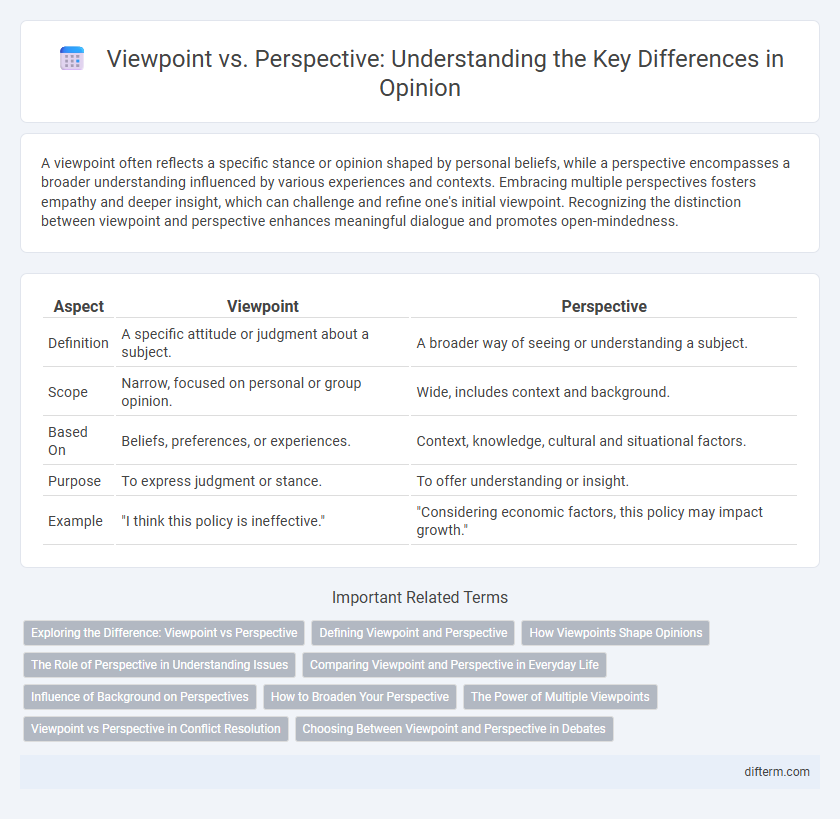A viewpoint often reflects a specific stance or opinion shaped by personal beliefs, while a perspective encompasses a broader understanding influenced by various experiences and contexts. Embracing multiple perspectives fosters empathy and deeper insight, which can challenge and refine one's initial viewpoint. Recognizing the distinction between viewpoint and perspective enhances meaningful dialogue and promotes open-mindedness.
Table of Comparison
| Aspect | Viewpoint | Perspective |
|---|---|---|
| Definition | A specific attitude or judgment about a subject. | A broader way of seeing or understanding a subject. |
| Scope | Narrow, focused on personal or group opinion. | Wide, includes context and background. |
| Based On | Beliefs, preferences, or experiences. | Context, knowledge, cultural and situational factors. |
| Purpose | To express judgment or stance. | To offer understanding or insight. |
| Example | "I think this policy is ineffective." | "Considering economic factors, this policy may impact growth." |
Exploring the Difference: Viewpoint vs Perspective
Viewpoint refers to the specific position or angle from which an individual observes or considers a situation, often shaped by personal experiences and beliefs. Perspective encompasses a broader, more comprehensive understanding that integrates multiple viewpoints and contextual factors to form a deeper interpretation. Exploring the difference highlights that viewpoint is more individual and limited, while perspective involves a wider, more empathetic and informed approach.
Defining Viewpoint and Perspective
Viewpoint refers to a specific position or angle from which an individual observes or considers an issue, often shaped by personal experiences and beliefs. Perspective encompasses a broader cognitive framework that influences how information is interpreted and understood, integrating emotional and cultural factors. Both viewpoint and perspective are essential in forming nuanced opinions, as they determine how facts and arguments are evaluated.
How Viewpoints Shape Opinions
Viewpoints serve as the foundational lens through which individuals interpret information and events, directly influencing the formation and intensity of opinions. The cognitive frameworks embedded within viewpoints guide selective attention and prioritize certain values, making opinions more resistant to change. Understanding the interplay between viewpoints and opinions reveals how biases and experiences shape judgment and societal discourse.
The Role of Perspective in Understanding Issues
Perspective shapes the understanding of issues by framing how information is interpreted and prioritized. Different cultural, social, and personal experiences influence perspective, leading to varied viewpoints on the same subject. Emphasizing perspective enables deeper insight into complex problems and promotes empathy across diverse opinions.
Comparing Viewpoint and Perspective in Everyday Life
Viewpoint refers to a specific position or angle from which an individual observes a situation, often shaped by personal experiences and biases. Perspective encompasses a broader framework, including cultural background, values, and emotional context that influence how one interprets and responds to events. Comparing viewpoint and perspective reveals that while viewpoint is more immediate and concrete, perspective offers a deeper, more comprehensive understanding of everyday life scenarios.
Influence of Background on Perspectives
Viewpoints often reflect immediate opinions shaped by current experiences, while perspectives encompass deeper insights influenced by an individual's cultural, educational, and familial background. Backgrounds shape biases and values that frame how people interpret information and react emotionally or intellectually to situations. Understanding the influence of background on perspectives highlights the complexity behind seemingly simple viewpoints.
How to Broaden Your Perspective
Broadening your perspective involves actively seeking diverse viewpoints and engaging with different cultures, experiences, and ideas to challenge your existing beliefs. Embracing open-mindedness and critical thinking allows for a deeper understanding of complex issues beyond a narrow viewpoint. Expanding your perspective fosters empathy, innovation, and more informed decision-making in personal and professional contexts.
The Power of Multiple Viewpoints
Embracing multiple viewpoints enhances critical thinking and fosters a deeper understanding of complex issues by revealing varied interpretations and underlying assumptions. Diverse perspectives stimulate creativity and innovation by challenging conventional wisdom and broadening analytical frameworks. Harnessing the power of multiple viewpoints cultivates empathy, promotes open-mindedness, and drives collaborative problem-solving in personal and professional settings.
Viewpoint vs Perspective in Conflict Resolution
Viewpoint and perspective play distinct roles in conflict resolution, where viewpoint refers to an individual's specific stance or belief about a situation, while perspective encompasses a broader understanding influenced by personal experiences and cultural background. Effective conflict resolution requires recognizing these differences to foster empathy and facilitate communication between parties. Emphasizing perspective allows for deeper insight into underlying motivations, whereas addressing viewpoints targets immediate disagreements.
Choosing Between Viewpoint and Perspective in Debates
Choosing between viewpoint and perspective in debates hinges on understanding their distinct nuances: viewpoint refers to a specific opinion shaped by individual experiences, while perspective encompasses a broader, more holistic understanding influenced by cultural and contextual factors. Emphasizing perspective allows debaters to acknowledge underlying values and assumptions, fostering empathy and deeper analysis. Prioritizing viewpoint provides clarity and directness, enabling precise argumentation and effective communication.
viewpoint vs perspective Infographic

 difterm.com
difterm.com